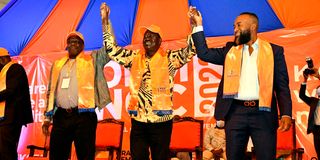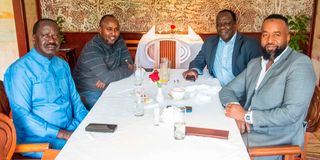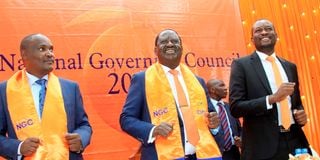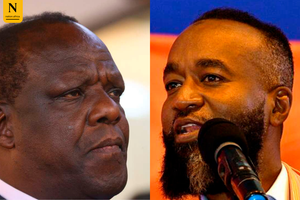
ODM party leader Raila Odinga (center) with his two deputies Wycliffe Oparanya (left) and co-leader Ali Hassan Joho during the party’s National Governing Council meeting at Bomas of Kenya on February 25, 2022.
The race to step into Mr Raila Odinga’s shoes in the Orange Democratic Movement (ODM) has evoked echoes of the planned party elections in 2014, with factions already emerging.
The jostling has become intense after Mr Odinga hinted in Wajir that he would relinquish the ODM leadership to his deputies – Ali Hassan Joho and Wycliffe Oparanya – should he become the African Union Commission chairman.
Mr Joho, Mr Ababu Namwamba (now Sports Cabinet Secretary) and then-Turkana Governor Josphat Nanok (now Deputy Chief of Staff in the Office of the President), led a faction that referred to itself as Team fresh, in the quest for the party’s top leadership positions in the aborted February 28, 2014 polls.
“In the unlikely event that I’m not elected, I will be back to continue serving you. Should I win, Joho and Oparanya are here and are able to steer this party to success,” Mr Odinga said recently.
Also Read: No one can or will inherit Raila
He has, however, blown hot and cold with the oft-repeated “I’m going nowhere”statement.
Even though, some party stalwarts have denied existence of camps in the orange outfit, the Sunday Nation has reliably established factions linked to Mr Joho, Mr Oparanya, and now a possible third force, largely consisting of leaders from Nyanza.
ODM Director of Political Affairs and National Assembly Minority Leader Opiyo Wandayi says Mr Odinga should remain the undisputed ODM leader whether he becomes AU Commission chairman or not.
He added that should he chose to relinquish the seat, the succession should not be a Joho-Oparanya “duopoly”.

ODM party leader Raila Odinga (left), during a past meeting with his two deputies Wycliffe Oparanya (second right), Ali Hassan Joho (right), and National Assembly Minority Whip Junet Mohammed.
He even hinted at joining the race should such the opportunity arise.
ODM Secretary-General Edwin Sifuna’s name has also emerged in the succession war, with some observers saying the Nairobi Senator has what it takes to face Mr Joho.
Political analyst Herman Manyora thinks the former Mombasa governor is the man to beat.
“Joho starts the race ahead of the pack, thanks to his deep pockets and age. He also has a solid Muslim constituency. His eloquence and youthful demeanour would give Oparanya a scare. If the past is anything to go by, Joho will easily draw youthful ODM leaders to his side,” Prof Manyora said.
Last Sunday, Mr Joho hosted Narok Senator Ledama Olekina and MPs Junet Mohamed (Suna East) and Babu Owino (Embakasi East) for a strategy meeting before launching their campaigns.
“Tumemaliza mkutano. Chama kiko Imara!” (We’ve ended the meeting. The party is strong),” Mr Joho posted on his social media pages.
Mr Owino only told the Sunday Nation that “something good is cooking,” when reached by phone.
In the 2014 scenario, the elections failed to take off at the Kasarani gymnasium when the infamous “Men-in-Black” destroying poll materials after some delegates protested “possible malpractices”.
Mr Joho was in the party deputy leader position race, Mr Namwamba wanted to be the secretary-general while Mr Nanok said he was suited to be the national chairman.
The team also had Eldas MP Adan Keynan who was seeking the vice-chairman position, Mr Simon Ogari (treasurer) and Mr Reuben Ndolo (organising secretary).
The other camp had then-nominated senator Agnes Zani for the secretary-general post, Dr Paul Otuoma (national chairman), Homa Bay Senator Otieno Kajwang (vice chairman), then-Kitutu Masaba MP Timothy Bosire (treasurer) and then-Balambala MP Abdikadir Aden (organising secretary).
Mr Bosire recalls that Mr Oparanya was their preferred candidate for the deputy leader position, “even though he never played radical politics and was not in the picture on many occasions”.
“The events today draw parallels with 2014. The stage, characters involved, the game, the interests and power play are the same. It is only the time and approach that are different,” the ODM Treasurer said.

Azimio la Umoja leader Raila Odinga with (from left) former Mombasa Governor Ali Hassan Joho, former Kakamega Governor Wycliffe Oparanya and Narc Kenya party leader Martha Karua at Matunda grounds Likuyani in Kakamega County on July 8, 2022.
It is Mr Odinga’s quest for the AU Commission post that has triggered intense jostling for the party top seat.
Senior ODM officials are scheming to exploit the party elections expected next month to plant their allies with an eye on taking over should Mr Odinga leave.
The ODM chief announced that party elections would begin from the grassroots next month, all the way to the county level and later at the national stage.
“We have dedicated the entire March to membership drives. The party elections will begin soon after the Muslim holy month of Ramadhan,” Mr Odinga told ODM delegates from Wajir on March 7.
The elections, he added, would begin from the polling station, to the ward, constituency, county level before the party holds national polls.
Political analyst Javas Bigambo links the succession politics in ODM to the 1990s battle for Ford Kenya following the death of the country’s first vice-president Jaramogi Oginga Odinga.
“Joho and Oparanya’s quest to lead the party is hollow. None has proffered any strong ideological position with which he intends to lead the opposition party. It is also being twisted because of lack of a clear succession plan,” Mr Bigambo said.
For Mr Dismas Mokua, another analyst, it is a chance for Mr Odinga to leave a legacy.
“Mr Odinga has the unique opportunity to cement his legacy in party and national politics as he goes to Addis Ababa to head the AU Commission. He can champion and spearhead free and fair party elections. Members and leaders should be given a free hand to compete for positions,” Mr Mokua said.
According to Mr Mark Bichachi, a commentator, the ODM succession is one to watch because it goes beyond the traditional tribal kingpin dynamics.
He says if the fight turns factional – Coast, Western, Nyanza and Nairobi regions – “it will be the most pyrrhic and hollow victory for all”.

ODM party leader Raila Odinga with party Chairman John Mbadi (L) and party Secretary General Edwin Sifuna during the ODM National Governing Council meeting held in Nairobi on March 1, 2019.
A former ODM lawmaker told the Sunday Nation that succession politics is usually infiltrated by party detractors and opponents, hence the need for vigilance.
“In 2014, for instance, there was a hidden hand that was out to consume our party as it was a huge bloc that posed a threat even to the then ruling coalition,” the former MP said.
“The hidden hand was assumed to propel the Joho, Namwamba and Nanok camp. Is it a coincidence that Namwamba and Nanok hold very senior positions in the present government?”
However, then-nominated MP Isaac Mwaura, who was believed to be in Dr Zani’s camp, is now the government spokesman while Mr Aden told the Sunday Nation that he joined President William Ruto’s United Democratic Alliance party in 2022.
The former lawmaker pointed out that there were concerns with the nature of the Joho-Namwamba camp campaigns in 2014, “a situation that could have largely contributed to the aborted elections”, leading to consensus.
“There were helicopters at their disposal and everyone was asking where the money was coming from,” he said.
In the consensus, Mr Joho and Mr Oparanya were named deputy party leaders while Mr Namwamba secured the secretary-general post, with Dr Zani being named his deputy.
Mr Nanok secured the vice-chairman seat against Mr Kajwang as Mr Bosire and Mr Abdikadir bagged the treasurer and organising secretary positions respectively.
Mr Bigambo says in the impending ODM succession, “there will be fireworks if Raila’s had appears anywhere”.
Kisumu Woman Representative Ruth Odinga is opposed to the narrowing of the succession to two individuals.
Awendo MP Walter Owino says Mr Odinga remains the undisputed ODM leader but should he relinquish the position, it should be left open for any member to contest “to avoid handpicking of leaders in boardrooms”.
“If Raila exits, bearing in mind that Nyanza forms the majority of membership of this party, the region must also be accorded equal opportunity to produce a candidate in the contest,” the Awendo MP told the Sunday Nation.
“Succession should not be limited to two individuals even though we have continued to see Oparanya as the only deputy who has stood with Raila for the entire period after the General Election last year. But we are not saying Oparanya and Joho do not merit to be ODM leaders. What we are saying is that loyalty and consistency matter a lot during such times.”











